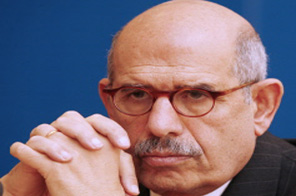Iran nuke threat 'hyped':ElBaradei
WASHINGTON: Mohamed ElBaradei, the outgoing head of the UN atomic watchdog, called the threat from Iran "hyped" and said there was no evidence that the Islamic republic will soon have nuclear weapons.
In an interview released Tuesday, the director general of the International Atomic Energy Agency (IAEA) hit back at critics who accuse the Egyptian of covering up Iran's nuclear ambitions.
"In many ways, I think the threat has been hyped," ElBaradei told the Bulletin of the Atomic Scientists, a Chicago-based magazine critical of nuclear weapons.
"Yes, there's concern about Iran's future intentions and Iran needs to be more transparent with the IAEA and international community," he said.
"But the idea that we'll wake up tomorrow and Iran will have a nuclear weapon is an idea that isn't supported by the facts as we have seen them so far," he said.
In a report last week, the IAEA said that Iran had slowed production of enriched uranium, which can be used to make a nuclear bomb, and agreed to tighter monitoring of its enrichment plant.
The United States downplayed the report, saying that Iran was still not cooperating fully with the UN inspectors.
Israel's Haaretz newspaper said that the IAEA report did not include a classified annex incriminating Iran. Israel has long been critical of ElBaradei and asked in 2007 that he be fired.
ElBaradei, who along with the IAEA as an institution won the Nobel Peace Prize in 2005, rejected the criticism.
"About Iran, I've been told, 'Mind your own business; you're a technician.' And yet, at other times, on other matters, I have been told that I'm the custodian of the nuclear Non-Proliferation Treaty -- sometimes by the very people who tell me to mind my own business when it comes to Iran," he said.
"I don't put much stock in either designation. I'm neither a custodian nor a technician; I'm merely someone who is trying to do his job," he said.
ElBaradei steps down at the end of November, handing over to Yukiya Amano, a veteran Japanese diplomat.
ElBaradei voiced hope that Iran and the United States would start dialogue, as proposed by US President Barack Obama, and also hoped for the resumption of talks with North Korea, which conducted a second nuclear test in May.
On North Korea "whenever a dialogue was taking place, things were on the right track. Whenever the dialogue stopped, things started to go bad. Now, two nuclear tests later, we have no choice but to talk to the North Koreans and understand where they're coming from," ElBaradei said.
North Korea in April bolted out of a six-nation denuclearization agreement, blaming UN-led sanctions over its earlier nuclear tests.
ElBaradei said that sanctions and the use of force should only be a last resort.
ElBaradei, who often butted heads with former US president George W. Bush's administration, renewed his criticism of the 2003 invasion of Iraq
"You can't jump the gun as the United States did in Iraq," he said.
"In total, one out of three Iraqis has had his or her life pulverized because of a war that never in my view should have been fought in the first place."






